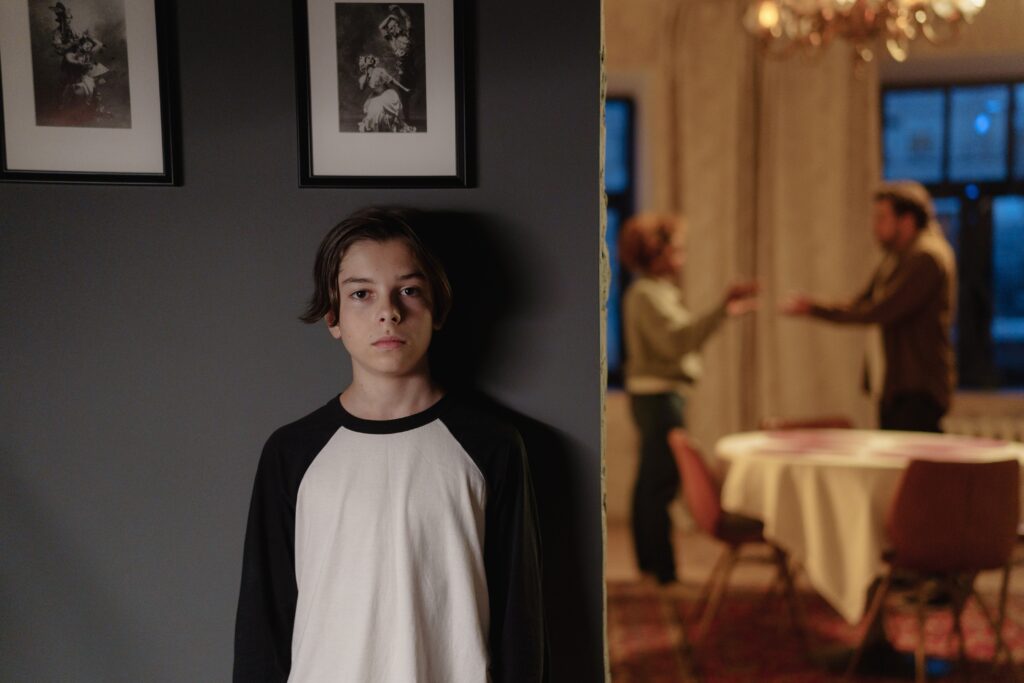 In my work with people, I’ve observed that there are five places we go when when we are hurt, frustrated, or upset by others.
In my work with people, I’ve observed that there are five places we go when when we are hurt, frustrated, or upset by others.
Three of these places make things worse, but the other two can bring a lot of healing, growth, and resolution. It’s vitally important to know where each destination leads.
I’ve written about two of the five before, but today, I want to expand my thoughts to include all the ways we might address our frustrations.
Here are the five places we go:
 #1 THE WOODSHED. The first place we might take someone is to the proverbial woodshed. In bygone days when someone misbehaved, they would be removed from the house and taken out back to the woodshed to receive a “whoopin.'” The walk to the woodshed was a walk of shame, and whatever happened in there was not going to be pleasant.
#1 THE WOODSHED. The first place we might take someone is to the proverbial woodshed. In bygone days when someone misbehaved, they would be removed from the house and taken out back to the woodshed to receive a “whoopin.'” The walk to the woodshed was a walk of shame, and whatever happened in there was not going to be pleasant.
When we are hurt or frustrated or upset with someone, it’s easy to take the woodshed approach, giving the person a verbal whoopin’ and calling him or her out for what we feel he or she has done to us. Yes, we’re being honest, of course, but honesty is not always the best policy. In the woodshed, we exclusively use “You-statements,” blaming-and-shaming the person who has infuriated us so much. There is no conversation in the woodshed.
The problem with this approach is that it causes added hurt (in response to hurt) and it doesn’t really accomplish anything, except perhaps the satisfaction of getting even. It certainly doesn’t result in relational transformation. When we perceive that someone is taking us to the woodshed, we naturally feel threatened and our natural impulse is to put our shields up, deflecting the incoming verbal missiles.
Physiologically, the amygdala in our brain senses the imminent danger of the woodshed, shuts down our logical “thinking” brain, and sends us immediately into “fight or flight” mode. In this frame of mind, we don’t listen, learn, or consider anything. We will either fight back to survive–saying things we rationally don’t really mean–or we’ll withdraw completely. Nothing good results from going to the woodshed!
 #2. STUFF, ETC. We who are less confrontational by nature will often stuff our negative feelings rather than take someone to the woodshed. We have learned to endure mistreatment silently, believing that the cost of saying something is greater than the cost of remaining quiet. We may feel too timid to bring up our concerns or we may not feel that we deserve to speak up.
#2. STUFF, ETC. We who are less confrontational by nature will often stuff our negative feelings rather than take someone to the woodshed. We have learned to endure mistreatment silently, believing that the cost of saying something is greater than the cost of remaining quiet. We may feel too timid to bring up our concerns or we may not feel that we deserve to speak up.
The problem with the Stuff, etc. destination is that unless we’re really good actors, our dissatisfaction will likely be perceptible anyway — maybe not through our words, but certainly through our attitudes, tone, body language, and demeanor. And even if we were to keep things stuffed for a long while, the pressure-cooker of pent up frustrations will eventually explode, taking us right back to the very place we were trying to avoid all along–the woodshed. And we know how that goes!
 #3. THE HOUSE OF MIRRORS. Have you ever been to one of those old-fashioned carnival attractions called The House of Mirrors? It’s infuriating because it’s like a maze inside–glass walls and mirrors everywhere you look–and you don’t know which way leads toward the exit. It might seem fun at first, but before long, it can get very frustrating. As you go along, you bump your face into a lot of glass walls! Ouch!
#3. THE HOUSE OF MIRRORS. Have you ever been to one of those old-fashioned carnival attractions called The House of Mirrors? It’s infuriating because it’s like a maze inside–glass walls and mirrors everywhere you look–and you don’t know which way leads toward the exit. It might seem fun at first, but before long, it can get very frustrating. As you go along, you bump your face into a lot of glass walls! Ouch!
This is exactly how some people handle their frustrations with others. True, they avoid the direct-assault approach of the woodshed and they aren’t stuffing their feelings completely, but this approach fails for different reasons.
Those of us who use the House of Mirrors approach communicate our frustration in ways that are indirect and unclear, dropping not-so-subtle hints about things we don’t like. Sarcasm is often used to make a point. Snide comments, little jabs, and “just kidding” jokes all hint at unexpressed dissatisfaction. Sometimes we play the victim, exuding a “poor me” attitude: “If only my wife would treat me respectfully like so-and-so’s.” Social media provides us a easy forum for expressing subtle complaints in the third person: “Why can’t teenagers these days be more respectful?” And sometimes we keep score, using measurements others don’t know they’re being critiqued on: “It’s been a whopping 31 days since you gave me a compliment!”
The House of Mirrors approach unfairly leaves the other person confused, insecure, shamed, and devalued–not the things that motivate people to change and grow. Instead it invites push-back and resistance.
 #4. THE CLASSROOM. Unlike the three previous destinations, the classroom is a great place to take the person with whom you have frustration. While the woodshed strikes fear into one’s heart, the classroom is a positive place of learning, growing, discovery, and improving. In the classroom, we help the person learn what we are feeling and experiencing when we are around him or her.
#4. THE CLASSROOM. Unlike the three previous destinations, the classroom is a great place to take the person with whom you have frustration. While the woodshed strikes fear into one’s heart, the classroom is a positive place of learning, growing, discovery, and improving. In the classroom, we help the person learn what we are feeling and experiencing when we are around him or her.
Here are two important “classroom guidelines:”
First, it’s vitally important to avoid blame and shame in the classroom, so stay focused on what has been going on within you rather than what they’ve been doing wrong. This is the proper place for using “I-statements,” indeed, it’s very important to avoid “you-statements” all together, lest we risk turning the experiential classroom into a lecture hall. In my previous essay on the Classroom approach, I gave several examples of recommended phrases, but here’s one example of what you might say:
“I find myself getting defensive when I feel criticized and I don’t like that about myself. I want to share something with you that I think will help: it would help me to grow and change if you could try to educate me rather than confront me. I know that approach works better for me and I know it will draw us closer. I’d appreciate it so much if you could give it a try.”
In my experience, such a blame-free approach is often effective since the other person doesn’t feel attacked or threatened. Respectfully expressing your concerns ensures that his or her “thinking brain” will remain at the forefront, where reflection occurs. (Of course, you can’t guarantee how the other person will react, but in my view, the best chance for change occurs in the classroom.)
Second, don’t take the person to the classroom for every hurt and feeling that you experience. That would be unreasonable and overwhelming–your whole relationship might seem confined to the classroom! People need recess time! Instead, start with one hurt that is either the most significant, or that is reoccurring, or that is easy to solve. Tackle one at a time and then move on to the next. You’ll gain confidence and celebrate progress with each lesson learned in the syllabus of life!
So get in the habit of taking the person you’re frustrated with to the classroom instead of the other three places you might go. But there is one more place I want to mention.
 #5. THE THRONE OF GOD. I mentioned this place last, not because it’s the least important — it is actually the most. I first wanted to present the various response options to interpersonal frustration, but now I want to propose that there are many times when it is best to say nothing at all, and simply bring the hurts and frustrations directly to God.
#5. THE THRONE OF GOD. I mentioned this place last, not because it’s the least important — it is actually the most. I first wanted to present the various response options to interpersonal frustration, but now I want to propose that there are many times when it is best to say nothing at all, and simply bring the hurts and frustrations directly to God.
Thankfully, whenever we’re feeling neglected or misunderstood or mistreated, we [Christians] have a God who perfectly understands our situation. Jesus experienced more injustice, humiliation, and abuse than any of us ever will.
Although He doesn’t promise to spare us from pain, He promises to walk with us through our pain as a fellow-sufferer. God offers understanding, comfort, and healing when we are suffering. We are not alone.
Jesus also modeled a supernatural power to love his enemies (including us!) and He can give us that same supernatural strength to rise above whatever mistreatment we may encounter from others, not returning evil for evil, and actually blessing those who have wounded us. On the rare occasion when we do this, Scripture calls it “a gracious thing in the eyes of God.” (1 Peter 2:19-24).
19 For this is a gracious thing, when, mindful of God, one endures sorrows while suffering unjustly. 20 For what credit is it if, when you sin and are beaten for it, you endure? But if when you do good and suffer for it you endure, this is a gracious thing in the sight of God. 21 For to this you have been called, because Christ also suffered for you, leaving you an example, so that you might follow in his steps. 22 He committed no sin, neither was deceit found in his mouth. 23 When he was reviled, he did not revile in return; when he suffered, he did not threaten, but continued entrusting himself to him who judges justly. 24 He himself bore our sins in his body on the tree, that we might die to sin and live to righteousness. By his wounds you have been healed.
I especially love the phrase “entrusting himself to him who judges justly.” As often as we are able, let’s give it to God to deal with and get back to loving others the way He loves us.
The Throne of God is also the place for us to go to ask for God’s help in our time of trouble. We should pray for God to give us wisdom and to soften our hearts toward the ones who hurt us, and we can pray that God would open their hearts as well. This will accomplish as much as anything.
The summary is this: take your hurts to God first, and when we do feel the need to say something, let’s be careful to skip the Woodshed, Stuff Etc., and the House of Mirrors, and take them straight to the Classroom! Oh, the places you’ll go if you do this well!
 Last week, I wrote about what I DO LIKE about the concept of Love Languages, but there’s more to be said. As promised, here are my problems with the Love Languages. I have two main concerns with 4 subpoints:
Last week, I wrote about what I DO LIKE about the concept of Love Languages, but there’s more to be said. As promised, here are my problems with the Love Languages. I have two main concerns with 4 subpoints:








 I conceptualized this essay 18 months ago, but recent events in our family have shown me that it’s time to flesh out my thoughts.
I conceptualized this essay 18 months ago, but recent events in our family have shown me that it’s time to flesh out my thoughts.



 I’ve met many Christians who are determined to never get a divorce due to their biblical convictions, but I find the goal of simply not getting divorced to be extremely short-sighted. I’m not here to make a case for or against divorce, but my point here is that there are many seemingly “intact” marriages that are so unhealthy that their kids can only be described as growing up in a broken home.
I’ve met many Christians who are determined to never get a divorce due to their biblical convictions, but I find the goal of simply not getting divorced to be extremely short-sighted. I’m not here to make a case for or against divorce, but my point here is that there are many seemingly “intact” marriages that are so unhealthy that their kids can only be described as growing up in a broken home.